Organic Society
 |
 |
 |
 |
 |
 |
 |
The Disappearing Family Farm
I do not like Time Magazine because its fare almost invariably is promoting the Revolution and the progressivist agenda. However, a
recent feature titled “They’re Trying to Wipe Us Off the Map. Small American Farmers Are Nearing Extinction” caught my eye, for it confirms many principles in our
Organic Society section.
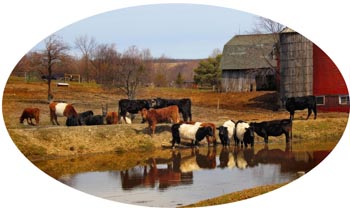 The organic development of a region, a city or town is sustained agriculturally by the area farmers. As Prof. Plinio Corrêa de Oliveira points out in his article Proportion between the City and the Man, many of the first families who founded the cities are descendants of the farmers in the area who had moved to the city. Thus, there were familial ties and bonds between the city and the country people.
The organic development of a region, a city or town is sustained agriculturally by the area farmers. As Prof. Plinio Corrêa de Oliveira points out in his article Proportion between the City and the Man, many of the first families who founded the cities are descendants of the farmers in the area who had moved to the city. Thus, there were familial ties and bonds between the city and the country people.
What the Time article pointed out – and surprisingly lamented – is the sad fact that small farms in America are dying out. Grocers are supplied by huge industrial farms from the four ends of the nation – and increasingly by other countries around the globe – instead of stocking local homegrown goods.
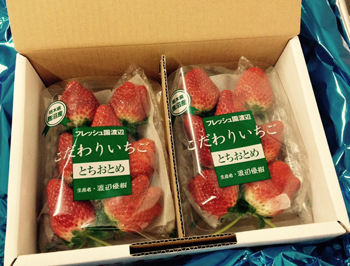
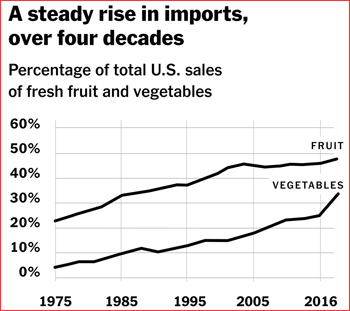 You go to a grocery store in Wenatchee, apple capital of the US, and purchase apple juice that comes from China instead of a Washington apple farm. Today China supplies 70% of apple juice consumed by Americans.
You go to a grocery store in Wenatchee, apple capital of the US, and purchase apple juice that comes from China instead of a Washington apple farm. Today China supplies 70% of apple juice consumed by Americans.
You add a jar of honey on sale at a very good price to your basket. What a deal! That honey, however, also comes from China where beekeepers use an antibiotic known as Chloramphenicol that is outlawed in the United States.
Some beautiful Gala apples and Muscat grapes catch your eye and are placed in the cart. The apples are “newly harvested” from New Zealand and the grapes imported from Chile. The red pepper for the lettuce grown in Mexico is from Peru. In fact, most of America’s fruits for sale in the markets are now imported.
What we ignore is that this generally means the food is picked less ripe, is a brand chosen for durability instead of flavor or nutrient content, can carry foreign air-borne bacteria etc. Do we really gain from the supposed cost savings?
But there is another greater danger: If a glitch develops in the supply chain due to a natural disaster or war, where do we get our food? The local farms and farmers are all gone. The big ones who specialize in a few crops and rely on exports to survive do not offer a solution.
This is where rural America is heading. “Get big or get out,“ Earl Butz, Nixon’s Secretary of Agriculture told farmers in the 1970s. In 2019 the Agriculture Secretary under President Trump, Sonny Perdue, echoes the same tune: “In America, the big get bigger and the small go out,“ she affirmed at the World Dairy Expo in Wisconsin last October.
Time reports that “the number of farms with more than 2,000 acres nearly doubled between 1987 and 2012, according to USDA data. The number of farms with 200 to 999 acres fell over that time period by 44%.”
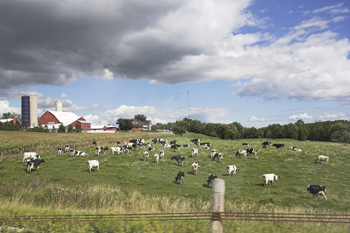 Many small American farmers are routinely selling their crops for less than it costs to produce them. “It’s very intimidating, you work hard every day, and every day, it seems like you’re just always struggling,” said John Rieckmann, one farmer who was featured in the article.
Many small American farmers are routinely selling their crops for less than it costs to produce them. “It’s very intimidating, you work hard every day, and every day, it seems like you’re just always struggling,” said John Rieckmann, one farmer who was featured in the article.
The Rieckmann family has raised cows for milk for two centuries in a town in middle Wisconsin. The 45 cows in his barns that once would have supported the family are not enough today. He cannot compete with the big dairies.
John had hoped to leave the farm to his two sons, age 55 and 50, who still live with the couple and run the farm. But it looks like this will not happen. They are $300,000 in debt, need a new tractor, and sometimes cannot even pay off the feed bill, much less the debt.
It is becoming impossible for young men to continue the family farm, raising their families there, with fathers teaching their sons how to plow, raise livestock and grow crops, mothers teaching their daughters how to bake bread, make pies, can vegetables and care for poultry. The wives work to support the farm. The children head for the universities and computer workshops. They get jobs in far-away cities and lose touch with the land, the family, the community and become part of the anonymous masses in apartments in suburbs or cities.
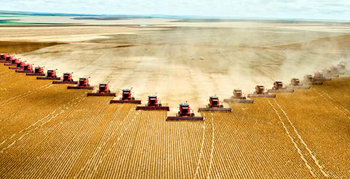 Do we understand what we are losing? It is literally the lifeblood of a family and community.
Do we understand what we are losing? It is literally the lifeblood of a family and community.
As the article notes, soon there will not be farms dotting the landscape of rural America: “Small dairy farmer Brenda Cochran is worried about the future of her rural Pennsylvania community as more farmers give up. Two neighbor farm auctions are scheduled soon. The dairy refrigeration supply business where she buys equipment is on the verge of collapse. Young people, seeing economic despair all around them, get out as quickly as they can. “I see this as a wholesale removal – or extermination – of our rural class,” she says.
“Right now there is nothing on the horizon to turn around these rural areas. Americans are increasingly concentrating in a few metropolitan areas. By 2040, 70% of Americans will live in 15 States. The regions surrounding America’s family farms may become the country’s next ghost towns.”
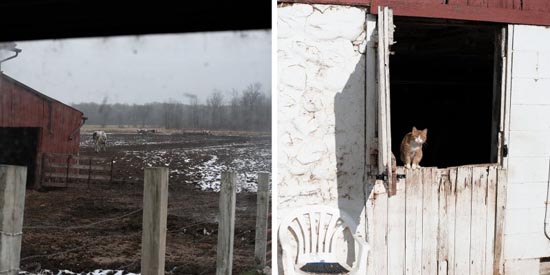
The picture above of a cat sitting on an old barn, the pasture and crops in the backdrop, the woods and hills behind, raises nostalgic memories in some city-dwellers who recall the old family farm.
But, even among these, most cannot imagine a life in the country where the cat catches mice in the cold barn instead of being pampered like a baby in the house. They cannot
fathom a life where you pray for rain for the crops during a dry spell; instead, oblivious to the agricultural community around them, they pray for a sunny day so a downpour does not ruin the football game.
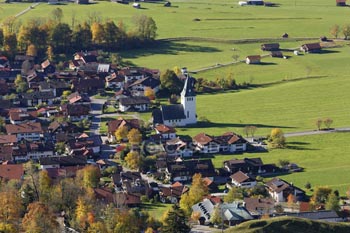 What we are losing is a whole mentality and spirit that was nourished in the Catholic Europe of the past, where it was implicitly understood that each one is part of a larger whole. The remnants of the organic life of Christian Civilization are rapidly dissipating and being replaced with a cold and sterile lifestyle.
What we are losing is a whole mentality and spirit that was nourished in the Catholic Europe of the past, where it was implicitly understood that each one is part of a larger whole. The remnants of the organic life of Christian Civilization are rapidly dissipating and being replaced with a cold and sterile lifestyle.
The article notes that one category of small farmers is thriving, that is, the organic farmers who charge a premium for crops and sell them locally. While this in itself is good, there is something artificial about it also.
Today organic food has become a commodity for the trendy and rich. For the lower and middle class, it entails the sacrifice of other goods and comforts just to be able to purchase good quality food and to eat in a healthful way.
This is, I note, the opposite of the organic life of the past, where every man had access to the same healthful food grown in his area, sold at a reasonable price. There was, as Prof. Plinio points out, a balance between the urban and country life in which each group of persons benefitted from the other and neither lost sight or knowledge of the other.
I believe that the authorities in charge of our common good should strive to succor a whole class that is quickly disappearing. I do not understand how our politicians and religious leaders, so concerned about the animals and plants facing extinction, are blind to an entire social and economical class that is truly endangered. A class that has constituted and still constitutes one of the important elements of our American mindset.

Posted December 2, 2019

The family farm - on its way to obsolete...
What the Time article pointed out – and surprisingly lamented – is the sad fact that small farms in America are dying out. Grocers are supplied by huge industrial farms from the four ends of the nation – and increasingly by other countries around the globe – instead of stocking local homegrown goods.

'Fresh' strawberries from the Asian markets

You add a jar of honey on sale at a very good price to your basket. What a deal! That honey, however, also comes from China where beekeepers use an antibiotic known as Chloramphenicol that is outlawed in the United States.
Some beautiful Gala apples and Muscat grapes catch your eye and are placed in the cart. The apples are “newly harvested” from New Zealand and the grapes imported from Chile. The red pepper for the lettuce grown in Mexico is from Peru. In fact, most of America’s fruits for sale in the markets are now imported.
What we ignore is that this generally means the food is picked less ripe, is a brand chosen for durability instead of flavor or nutrient content, can carry foreign air-borne bacteria etc. Do we really gain from the supposed cost savings?
But there is another greater danger: If a glitch develops in the supply chain due to a natural disaster or war, where do we get our food? The local farms and farmers are all gone. The big ones who specialize in a few crops and rely on exports to survive do not offer a solution.
This is where rural America is heading. “Get big or get out,“ Earl Butz, Nixon’s Secretary of Agriculture told farmers in the 1970s. In 2019 the Agriculture Secretary under President Trump, Sonny Perdue, echoes the same tune: “In America, the big get bigger and the small go out,“ she affirmed at the World Dairy Expo in Wisconsin last October.
Time reports that “the number of farms with more than 2,000 acres nearly doubled between 1987 and 2012, according to USDA data. The number of farms with 200 to 999 acres fell over that time period by 44%.”

The small dairy farm cannot compete with industrial giants and imports
The Rieckmann family has raised cows for milk for two centuries in a town in middle Wisconsin. The 45 cows in his barns that once would have supported the family are not enough today. He cannot compete with the big dairies.
John had hoped to leave the farm to his two sons, age 55 and 50, who still live with the couple and run the farm. But it looks like this will not happen. They are $300,000 in debt, need a new tractor, and sometimes cannot even pay off the feed bill, much less the debt.
It is becoming impossible for young men to continue the family farm, raising their families there, with fathers teaching their sons how to plow, raise livestock and grow crops, mothers teaching their daughters how to bake bread, make pies, can vegetables and care for poultry. The wives work to support the farm. The children head for the universities and computer workshops. They get jobs in far-away cities and lose touch with the land, the family, the community and become part of the anonymous masses in apartments in suburbs or cities.

Combines on an industrial farm bring in the harvest
As the article notes, soon there will not be farms dotting the landscape of rural America: “Small dairy farmer Brenda Cochran is worried about the future of her rural Pennsylvania community as more farmers give up. Two neighbor farm auctions are scheduled soon. The dairy refrigeration supply business where she buys equipment is on the verge of collapse. Young people, seeing economic despair all around them, get out as quickly as they can. “I see this as a wholesale removal – or extermination – of our rural class,” she says.
“Right now there is nothing on the horizon to turn around these rural areas. Americans are increasingly concentrating in a few metropolitan areas. By 2040, 70% of Americans will live in 15 States. The regions surrounding America’s family farms may become the country’s next ghost towns.”

The picture above of a cat sitting on an old barn, the pasture and crops in the backdrop, the woods and hills behind, raises nostalgic memories in some city-dwellers who recall the old family farm.
But, even among these, most cannot imagine a life in the country where the cat catches mice in the cold barn instead of being pampered like a baby in the house. They cannot
fathom a life where you pray for rain for the crops during a dry spell; instead, oblivious to the agricultural community around them, they pray for a sunny day so a downpour does not ruin the football game.

A Bavarian village:
town & country harmonically linked
The article notes that one category of small farmers is thriving, that is, the organic farmers who charge a premium for crops and sell them locally. While this in itself is good, there is something artificial about it also.
Today organic food has become a commodity for the trendy and rich. For the lower and middle class, it entails the sacrifice of other goods and comforts just to be able to purchase good quality food and to eat in a healthful way.
This is, I note, the opposite of the organic life of the past, where every man had access to the same healthful food grown in his area, sold at a reasonable price. There was, as Prof. Plinio points out, a balance between the urban and country life in which each group of persons benefitted from the other and neither lost sight or knowledge of the other.
I believe that the authorities in charge of our common good should strive to succor a whole class that is quickly disappearing. I do not understand how our politicians and religious leaders, so concerned about the animals and plants facing extinction, are blind to an entire social and economical class that is truly endangered. A class that has constituted and still constitutes one of the important elements of our American mindset.

Posted December 2, 2019
Organic Society was a theme dear to the late Prof. Plinio Corrêa de Oliveira. He addressed this topic on countless occasions during his life - at times in lectures for the formation of his disciples, at times in meetings with friends who gathered to study the social aspects and history of Christendom, at times just in passing.
Prof. Plinio
Atila S. Guimarães selected excerpts of these lectures and conversations from the transcripts of tapes and his own personal notes. He translated and adapted them into articles for the TIA website. In these texts fidelity to the original ideas and words is kept as much as possible.






